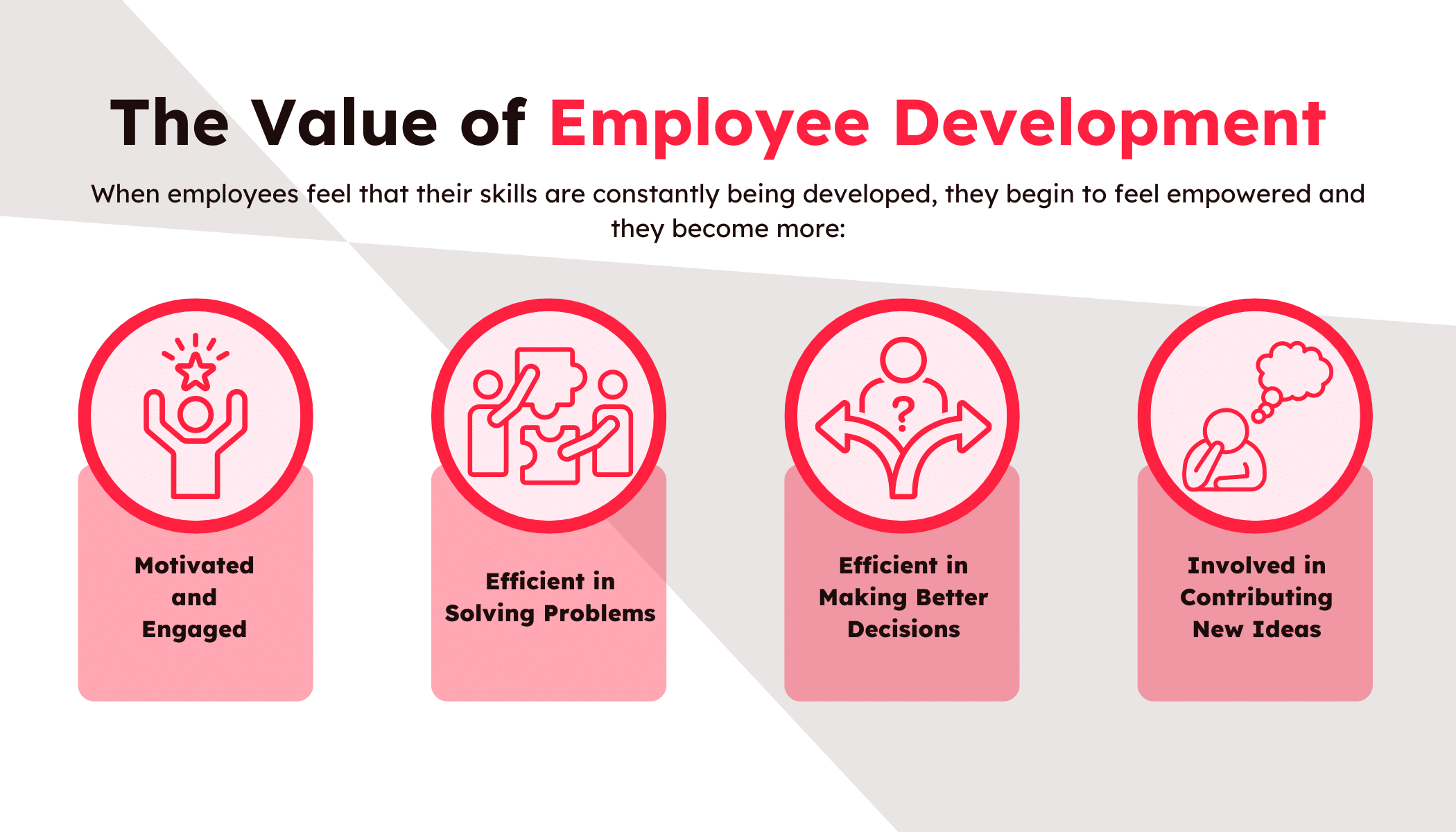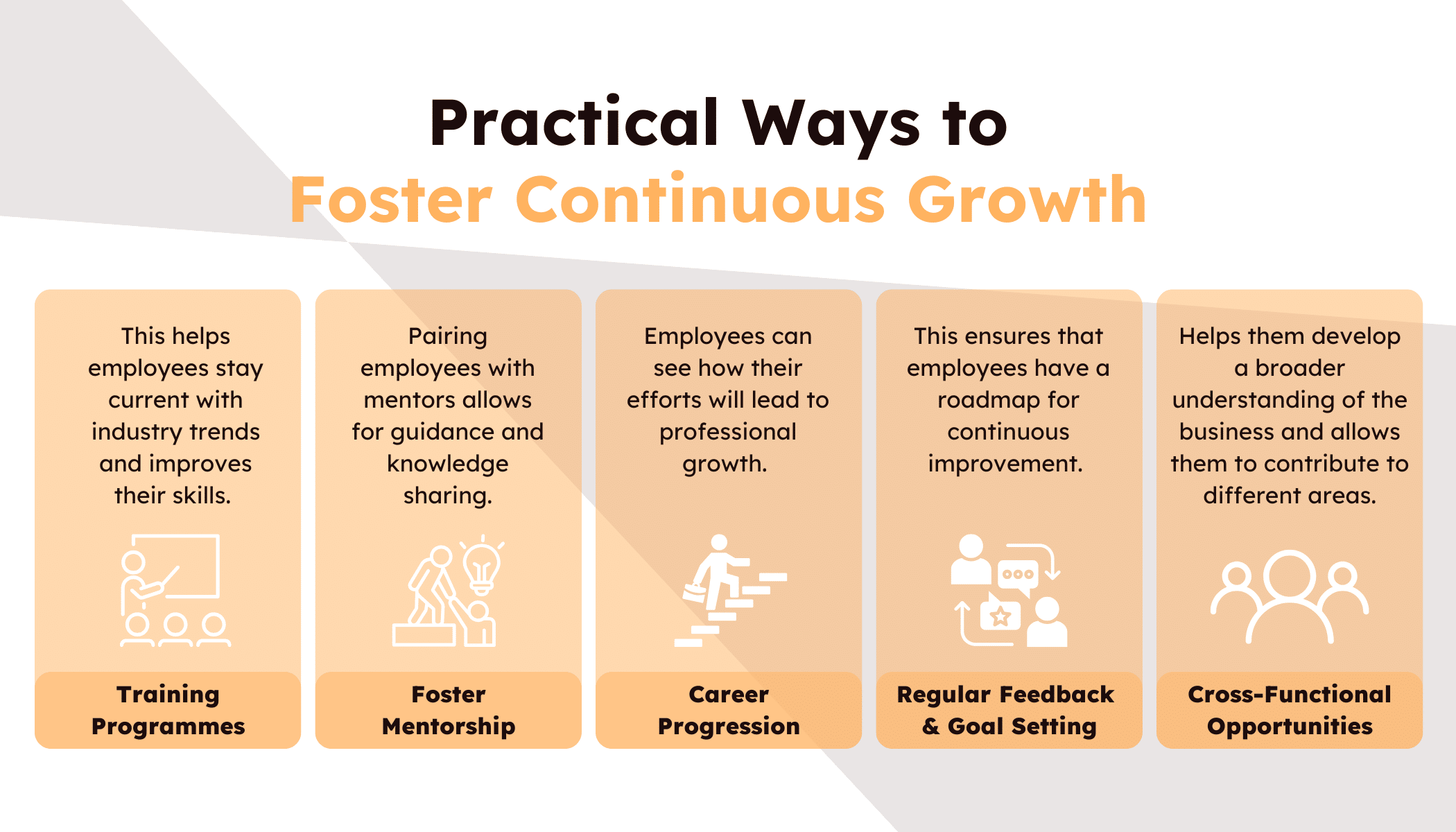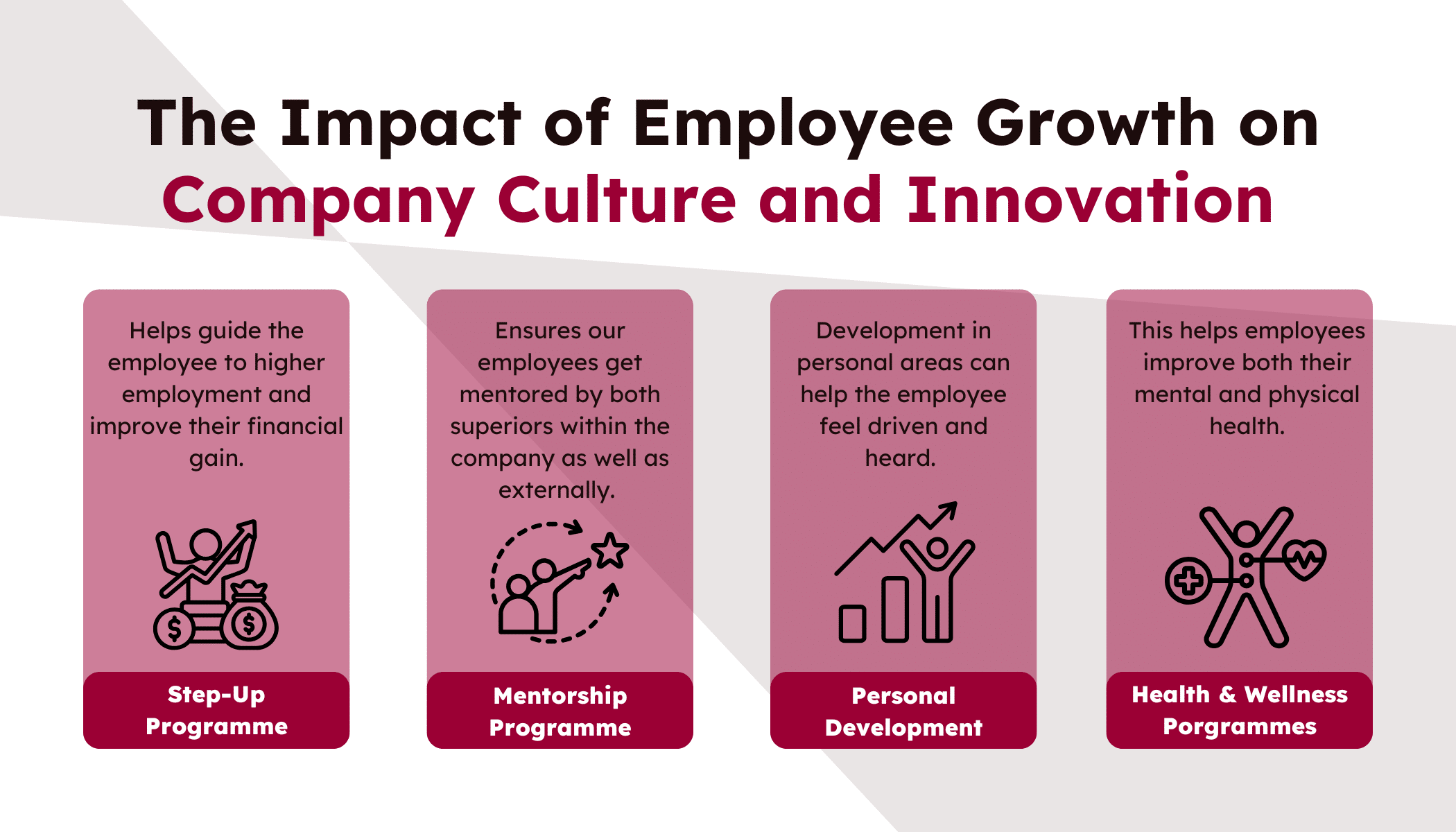In many organisations, employee development is treated as a secondary priority, overshadowed by short-term revenue targets and immediate operational demands. But the truth is, the internal growth of employees is one of the most powerful levers for driving sustainable business success. Companies that invest in their people see higher engagement, greater innovation, and long-term profitability.
In this blog, we’ll unpack why continuous employee growth matters, how it fuels organisational success, and practical ways to foster a growth-oriented culture that benefits both employees and businesses.
The Value of Employee Development
Employee growth is more than just promotions or annual performance reviews. It’s about creating growth opportunities for employees that strengthen their skills, expand their knowledge, and prepare them for future challenges.
When businesses adopt this mindset, employee growth becomes an asset rather than a cost. Workers who feel supported in their professional journey are more engaged, motivated, and loyal. They are also more likely to bring fresh ideas and innovative thinking to the workplace.
In fact, studies consistently show that companies that prioritising learning and development achieve higher productivity and stronger financial results. By committing to the internal growth of employees, organisations build a workforce that is resilient, creative, and capable of driving long-term value.
Creating a Growth-Oriented Culture
For employee development to thrive, it needs to be embedded in company culture. A growth-oriented culture signals to employees that learning and improvement are not optional extras, but key to how the business operates.
This culture can take many forms:
Structured training programmes that help employees keep pace with industry trends.
Mentorship opportunities that encourage knowledge sharing across seniority levels.
Cross-functional collaboration, giving employees the chance to learn beyond their core roles.
Leadership plays a decisive role here. When leaders actively model curiosity and development, for example, by taking part in training themselves or giving constructive feedback, employees are encouraged to do the same. As a result, loyalty deepens, and retention rates rise.
This ties closely to the idea of purpose-driven work. Employees who feel they’re continuously learning and developing tend to have a greater sense of belonging and purpose – a dynamic we explored in our piece on the importance of purpose-driven work for company culture.
How Employee Growth Leads to Business Success
There’s a direct and measurable link between employee growth initiatives and company performance.
Higher productivity: Employees who sharpen their skills can solve problems faster and deliver higher-quality work.
Better client satisfaction: A skilled workforce provides more innovative solutions and stronger service.
Greater adaptability: Continuous learners can pivot quickly in response to market changes.
For example, during the global shift to remote work, companies that had already prioritised digital skills and collaboration training adapted with minimal disruption. Their investment in people paid off with agility and resilience.
This ability to evolve under pressure isn’t just advantageous, it’s necessary. Businesses that embed organisational and employee growth into their strategies consistently outperform competitors who view training as an afterthought.
The Benefits of Investing in Employees
One of the most overlooked benefits of employee development is its long-term return on investment. Recruitment is costly, and high turnover disrupts company momentum. By prioritising internal growth of employees, businesses create clear pathways for career advancement, making staff more likely to stay.
The payoff extends further:
Cost savings from reduced turnover and recruitment expenses.
Enhanced brand reputation, as clients notice the positive impact of engaged, skilled employees.
Sustainable innovation, where new ideas come organically from within the team.
In short, supporting growth initiatives doesn’t just benefit individuals, it creates compounding returns across the entire organisation.

Practical Ways to Foster Continuous Growth
Building a culture of growth requires both vision and structure. Here are actionable ways to prioritise the development of your team:
Offer Training Programmes: Providing access to professional development resources such as courses, certifications, and workshops helps employees stay current with industry trends and improves their skills.
Foster Mentorship: Pairing employees with mentors allow for guidance and knowledge sharing, helping employees to learn from experienced leaders within the organisation.
Create Career Progression Paths: Outline clear career progression opportunities so employees can see how their efforts will lead to professional growth.
Regular Feedback and Goal Setting: Providing employees with regular feedback and setting growth-oriented goals promises they have a roadmap for continuous improvement.
Encourage Cross-Functional Opportunities: Encouraging employees to work with other teams helps them develop a broader understanding of the business and allows them to contribute to different areas, encouraging creativity and innovation.
Digital platforms like LinkedIn Learning, Coursera, and Udemy can also supplement in-house programmes, allowing employees to learn flexibly and at their own pace.

Employee Growth and Company Culture at Ruby Digital
At Ruby Digital, we recognise that our people are at the heart of our success. One of our core values is placing employees at the forefront of development, ensuring both personal and professional growth.
We’ve introduced initiatives that embody this commitment:
The Step-Up Programme: A structured pathway with milestones to guide employees towards higher positions and financial growth.
Mentorship Programmes: In conjunction with our Step-Up programme, employees are mentored and supported by internal leaders and experts.
Personal Development Assistance: Beyond professional skills, we help employees explore personal interests that support growth and wellbeing.
Health and Wellness Programmes: We support mental and physical health through our optional wellness programmes, helping employees thrive in and outside of work. Additionally, employees can earn points by reaching wellness goals, which can be redeemed for discounts and exclusive deals through the Health and Wellness platform we use.

Growth Spurs Innovation and Resilience
Continuous learning drives more than individual development — it shapes the DNA of company culture. A business that invests in employee growth initiatives encourages collaboration, experimentation, and creativity. Employees feel empowered to share ideas and pursue new solutions, making innovation a natural by-product.
This environment also prepares companies for the unexpected. When employees are adaptable and skilled, organisations remain agile in the face of disruption — whether it’s technological change, new competitors, or shifts in client expectations.
We’ve also written about how remote work impacts company culture and how to retain employees in today’s digital workplace, both of which connect back to the same truth: growth is what sustains success.
Growth Today, Success Tomorrow
The internal growth of employees is not a nice-to-have, it’s a strategic imperative. By fostering a culture of continuous learning, businesses strengthen productivity, encourage innovation, and boost retention.
Organisations that prioritise growth opportunities for employees not only build a more engaged workforce but also create a foundation for lasting business success.
If your company hasn’t yet made employee growth a core initiative, now is the time to start. When employees grow, businesses grow, and the future becomes brighter for both.


